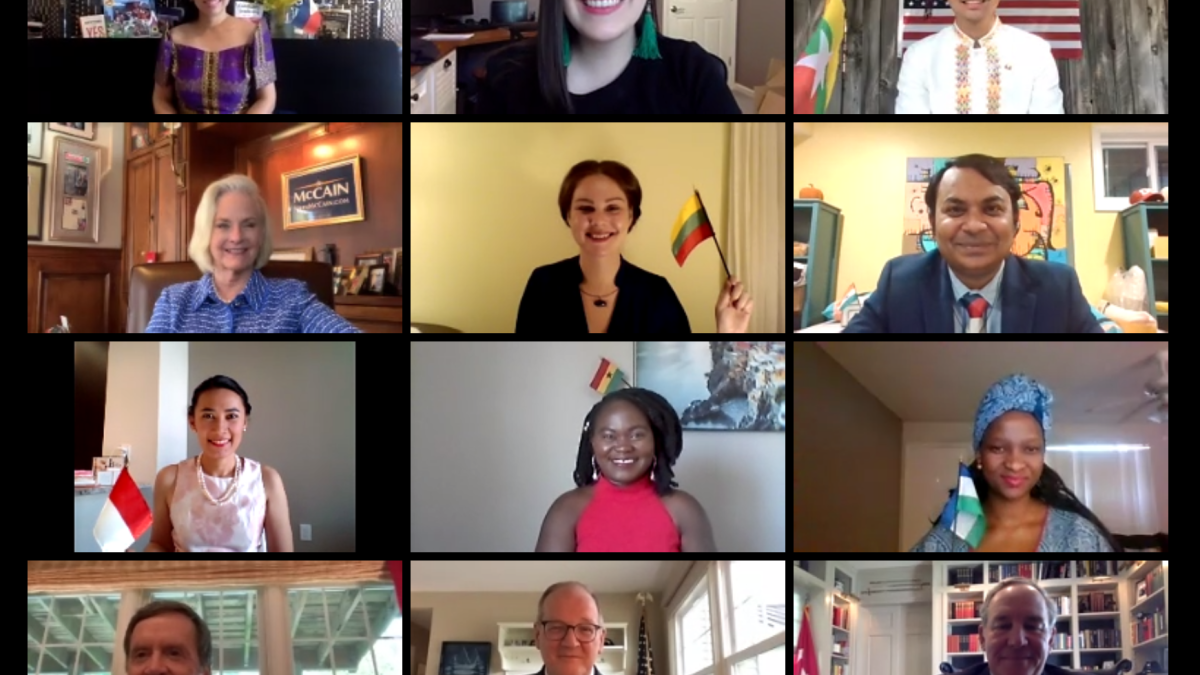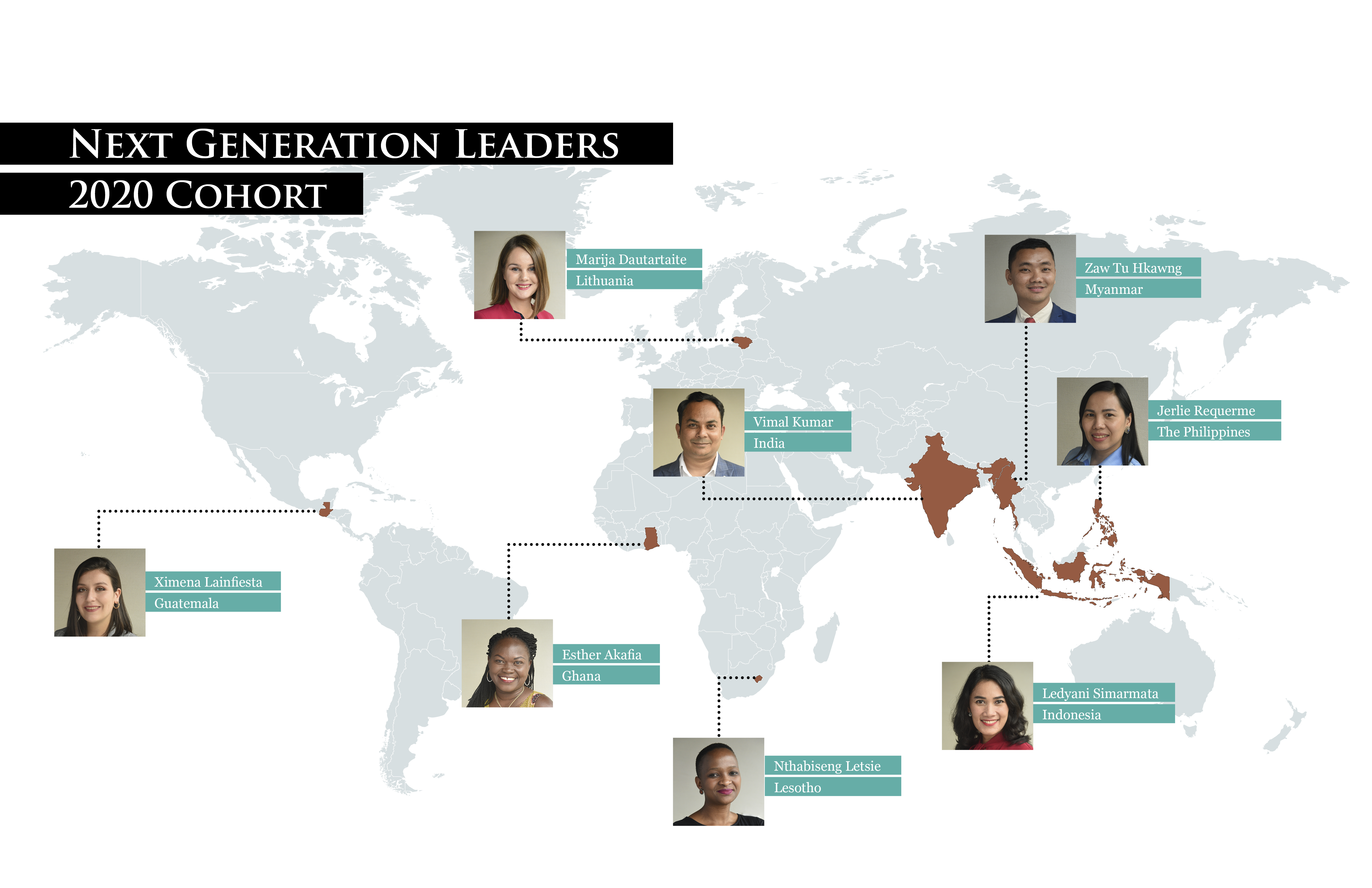8 Next Generation leaders graduate amid COVID-19

The McCain Institute's Next Generation Leader 2020 cohort with Board Chair Cindy McCain and Executive Director Mark Green.
The 2020 Next Generation Leader Cohort has completed its nine-month intensive leadership training program through the McCain Institute for International Leadership at Arizona State University.
Speaking at their virtual graduation, an institute first, Board Chair Cindy McCain recognized the cohort’s perseverance in “a moment when you can almost feel history swinging on its hinge.”
Executive Director Ambassador Mark Green emphasized that one critical aspect of their character-driven leadership is being “always ready to say ‘no’ — if ‘yes’ would mean surrendering core values and principles.”
Read Ambassador Mark Green’s full remarks | Read Cindy McCain’s full remarks
This year’s cohort had an extra challenge thrown at them when the COVID-19 pandemic spread across the globe during the last months of the Next Generation Leader’s individual placements. What may have seemed like an ambitious simulated test on leadership in another time, this real-world global crisis gave the Next Generation Leaders of the 2020 cohort the chance to put their newly acquired character-driven leadership skills into action in their communities.
Next Generation Leader Esther Akafia, an attorney from Ghana, is the founder and executive director of the Pioneers International Academy, an institute focused on providing quality and affordable elementary education in areas of need. Her Leadership Action Plan focuses on creating access to quality and affordable early childhood, primary and secondary education across Africa and through this develop leaders for the opportunities and challenges of their communities and the world.
“Character-driven leadership is being able to do what’s right consistently,” Akafia said. “Problems are there to be solved. The lack of access to education (in Ghana) is a problem. Education is a human right, and that is how we have start seeing it.”
Throughout her Next Generation Leader training and placement at BASIS Charter Schools in Phoenix, Akafia was able to continue to lead Pioneers International Academy from afar — a nod to her strong leadership skills and the stellar team she has put in place in Ghana. When the coronavirus started to spread through China, Akafia foresaw the challenge it might place on education systems worldwide, and she knew she had to get ahead of it.
As the virus crept into North America and Africa, and schools started to close, Akafia and her team at Pioneers International Academy had to be more innovative in delivering learning content in a digital format — in a place that doesn’t normally have access technology in educational settings. These experiences have given her a head start at the chance to apply the lessons of character-driven leadership she has learned during the Next Generation Leader program year.
Akafia also took it upon herself to purchase a Zoom account and start free writing classes for grades 1–8. Students from all over the world signed up.
“Kids in Ghana are meeting kids in Canada, in Norway. They are realizing we are all similar,” Akafia said. “They are noticing each other strengths and learning from each other. We think COVID-19 is a calamity, but out of it, we are building networks. The world is being brought together.”
Next Generation Leader Jerlie Requerme, a judge from the Philippines, will be using the leadership lessons she took away from her experience to secure justice through technology by the digitization of records in order to preserve the integrity of court records and the entire judicial system as a whole.
Her biggest leadership takeaway from the interactions she had throughout the program was during the cohort’s meeting with Arizona State University President Michael Crow.
Crow stated that everyone has, on average, 22,000 days in their lives and posed the question, “What are you going to with those days?”
“What he said about the 22,000 days — it’s not a lot; it’s all we got — it drives home the sense of urgency,” Requerme said. “We know there is so much to be done with so limited amount of time. The things that we learned here — about values, about character, about leadership — we will be able to use that to implement the reforms that are much needed in our respective communities. We have to make each day count.”
Requerme faced setbacks during the Next Generation Leader program year in gaining support back in the Philippines for her leadership action plan. However, with her leadership, her sense of urgency and with COVID-19 demonstrating the importance of technology in many areas, including the justice sector, Requerme returns home postgraduation with a great opportunity for her plan to make a big difference, given the current environment in the Philippines.
“We need to put up the IT infrastructure so that we can run our court system efficiently and digitize court records, so they are not subject to natural calamities — ones that the Philippines is known for,” Requerme said. “The urgency was seen pre-COVID, and it is seen more now because of COVID. We need to have the foresight and prepare.”
After finishing their placements in organizations relevant to their goals, this year’s Next Generation Leaders now head back to their home environments to implement their leadership action plans — putting the values-driven leadership skills honed during their time with the McCain Institute into practice to bring about positive change.
“Each cohort is special, as is how they form a leader network that now spans 60 countries,” said Ambassador Michael Polt, senior director of leadership programs. “But this one is uniquely prepared to lead through adversity, and I expect uniquely impactful results,” he added.

More Law, journalism and politics

Exhibit uses rare memorabilia to illustrate evolution of US presidential campaigns
After one of the most contentious elections in history, a new museum exhibit offers a historical perspective on the centuries-old…

TechTainment conference explores the crossroads of law, technology, entertainment
What protections do writers, actors, producers and others have from AI? Will changing laws around name, image and likeness (…

How to watch an election
Every election night, adrenaline pumps through newsrooms across the country as journalists take the pulse of democracy. We…